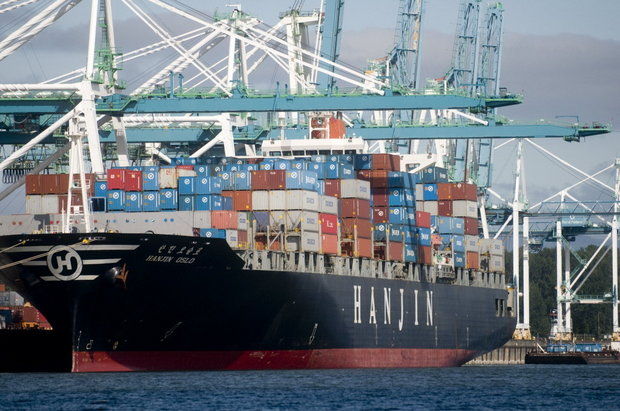forum
library
tutorial
contact

Kitzhaber Prods Port, Unions, Employers to Keep
Hanjin Shipping Cargo Vessels from Abandoning Portland
by Richard Read
The Oregonian, December 6, 2013
|
the film forum library tutorial contact |

|
Kitzhaber Prods Port, Unions, Employers to Keep
by Richard Read
|
 Gov. John Kitzhaber is riding herd on the Port of Portland, the Port's terminal manager, union electricians, dock workers and longshore employers to keep Hanjin Shipping Co.'s cargo ships from deserting the River City.
Gov. John Kitzhaber is riding herd on the Port of Portland, the Port's terminal manager, union electricians, dock workers and longshore employers to keep Hanjin Shipping Co.'s cargo ships from deserting the River City.
Kitzhaber virtually knocked heads together during secret Nov. 22 talks in Portland's World Trade Center, warning participants beforehand in a letter that Hanjin's scheduled departure at year's end would be "a severe blow to Oregon's economic recovery, one that will produce effects throughout the state for years to come."
Key to reaching a deal among the warring parties would be finally ending acrimony over the equivalent of two infamous jobs plugging, unplugging and monitoring refrigerated containers, or reefers, at the Port's container terminal.
Leaders of the powerful International Longshore and Warehouse Union covet the work, which is performed at Terminal 6 by members of the International Brotherhood of Electrical Workers.
Resolution of the reefer issue has eluded a federal judge, administrative law judges, the National Labor Relations Board and former Gov. Ted Kulongoski, who brokered days of arduous negotiations behind closed doors. At times, freight has backed up from Gresham to Guangzhou, trucks have lined up for miles outside T-6 and cargo vessels have bypassed Portland as feuding parties sue one another and argue over the two jobs.
"I can't speak to what any of the parties might be willing to give or take, but the reefer jobs are part of the conversation," said Duke Shepard, a labor and human services policy adviser to Kitzhaber. "We're not going to make progress here without addressing that in some way or another."
Shephard confirmed the Nov. 22 meeting occurred, adding that "it's not totally shocking, it's just annoying" that a reporter found out about it.
Sworn to secrecy by Kitzhaber, the parties are working against the clock to develop a proposal for Hanjin managers, who threaten to stop weekly calls on Portland mainly because they say loading and unloading ships at T-6 has become far too slow.
Left in the dark until now are thousands of exporters and importers across the Northwest, ranging from big importers such as Fred Meyer Inc. and Columbia Sportswear Co. to small farmers exporting hay, who depend on the troubled terminal for access to world markets. If Hanjin pulls out, the businesses will have to pay more to truck each container to and from the ports of Seattle and Tacoma.
Tantalizing prospects drive the negotiations, which Shepard continues one-on-one with each party. One idea would be for the electricians to cede the two jobs to the San Francisco-based longshore union, which could claim a long-sought victory for its members up and down the West Coast.
But what would the electricians' union get in return? And what would the longshore union give in exchange?
The most obvious answer, in the case of the longshore union, would be increased productivity, moving containers faster on and off ships. But doing that immediately could amount to a tacit admission of perjury, as straight-faced longshore union leaders continue swearing under oath at ongoing NLRB hearings in Portland that they're not staging slowdowns.
Instead longshore leaders blame ICTSI Oregon Inc., the Port's terminal operator, which hires dock workers. The union bosses cite poor management and repeatedly try to tar ICTSI's reputation, dissing it as a foreign-owned venture controlled by a parent company in the Philippines.
ICTSI, in turn, argues that Port contracts require the two jobs be performed by electricians. And around and around it goes.
Breaking the stalemate would likely require amendment of the Port's contract with ICTSI and longstanding labor agreements. The Port might have to kick in more subsidies for each container moved, sweetening the deal for Hanjin and ICTSI.
Awarding the jobs to the ILWU would bolster the longshore union as it girds for contract-renewal talks next year with the Pacific Maritime Association, a group of West Coast employers also represented at the Nov. 22 meeting.
Shepard, who attended the meeting, said Leal Sundet, an ILWU coast committeeman present in the conference room, made no promises concerning increased productivity. "That wasn't the tenor of the conversation," said Shepard, adding there were no quid pro quos. "It was a broader conversation about resolving all the conflicts and increasing productivity and making the terminal competitive."
Another idea would be for all parties to drop their lawsuits, which tie up courts and rack up hundreds of thousands of dollars in legal bills.
"We did not make that ask," Shepard said. "In an ideal world we would like to see everybody not suing each other and just make the best terminal possible."
Kitzhaber had scheduled another meeting Friday. But that has been postponed indefinitely as Shepard scrambles behind the scenes to cobble together a deal and a pitch to Hanjin's top managers in South Korea. The ocean carrier's bosses in Seoul will make the decision whether to stay or end two decades of service.
Shepard is pressing for a breakthrough soon, given the governor's sense of urgency.
"We might continue to just have individual conversations," Shepard said. "If it seems like a good use of everyone's time to get together, we'll do it."
Kitzhaber, he added, would clear his schedule to preside.
learn more on topics covered in the film
see the video
read the script
learn the songs
discussion forum
